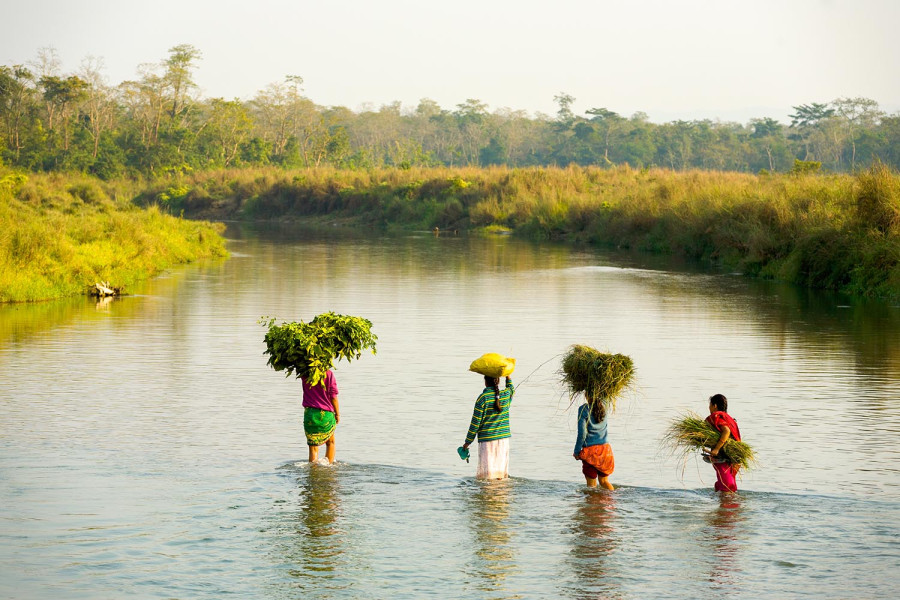Fiction Park
The silence of the scroll
A tale of loss, rage, and resilience in a village where the internet died but human voices rose.
Santosh Kalwar
In the heart of Bananapur—a quiet, sun-scorched land where banana groves stretched for miles like a cruel joke under a blazing sky—something strange and heavy settled over the people. It wasn’t a storm. It wasn’t war. It was silent. A digital silence.
The government—bloated with greed, drunk on power—had pulled the plug. Major social media websites and platforms were shut down. Declared “unregistered threats” to national security, they were erased with the flick of a bureaucratic switch. Only TikTok and Viber remained—not because they were innocent, but because they paid the right people. Their survival was bought, not earned.
For the people of Bananapur, this wasn’t just an inconvenience. It was a wound.
Everybody in the village gathered, some of them looked at their smartphones as if they were broken mirrors. Loading screens. Government-approved news tickers. Nothing more. The internet—once a cacophonous, mad, beautiful mess of memes, messages, marketplaces, and movements—had spoken itself into silence. And in quiet, something else resonated: the hum of lives disintegrating.
Kancha Dai, a farmer with calloused hands and tired eyes, sat on a cracked wooden bench. His phone lay in his lap—useless. He didn't throw it. He didn’t scream. He just stared. The screen reflected nothing. No messages from his son working in Qatar. No weather alerts for his crops. No funny videos to share with his neighbours after a long day. Just… nothing.
The air smelled sweet—too sweet. Ripe, rotting bananas fermented under the heat. It was the smell of abundance gone bad.
His wife, Sita, walked over. Her sari was dusty, her arms full of wilted vegetables from the market. “Oy Budho,” she said, voice flat with exhaustion, “the radio says this is for our own good. ‘No more fake news. No more distractions.’ But… how will we know when the fertiliser subsidy arrives? All the WhatsApp farmer groups are dead.”
Kancha Dai regarded her. Not angry. Not even angry. Just… empty. “For our good?” he repeated. “Budhi, this is not protection. This is robbery. They stole our money. Now they’ve stolen our voices. Social media? Well, of course, it provided false hope. But this silence? Bad. Worse. It's like being buried alive and conscious.”
Her daughter, Priya, had run screaming into the square, her eyes wild, her phone gripped like a wounded bird. She was 22. She had created a tiny startup online business selling bespoke jewellery—peacock earrings, necklaces embroidered with local beads—all on Instagram. Her clients weren’t from the village next door. They were based in Kathmandu. In Delhi. Even abroad. She had DMs, orders, followers, and ambitions.
Now? All gone.
“Amaa! Buwa!” she cried. “Instagram is blocked! My shop is gone! My customers can't reach me! How will I eat? How will I live? This ban is killing me!”
Her panic sparked something in the crowd. Others stepped forward—farmers, students, shopkeepers—all feeling the same invisible chokehold.
Hari Dai, a senior citizen, leaned on his stick. His spine was crooked with years of work. His voice, like gravel, cut through the din. “Killing us, nani? We’ve been dead since the day we were born. That internet? It gave us ghosts to converse with. Videos of politicians accepting bribes, partying hard in Dubai and Europe while we languished—everybody had them. But did anything change? No. Now, in this silence, we're not even ghosts. We’re just… air.”
Then came Gopal—the local shopkeeper and owner of the now-empty cyber café. His belly was round, his smile oily. He had made money off the internet, too—charging villagers to scroll, chat, and escape. But he was also one of the few who still had access because he played by the government's rules. He even helped enforce them.
“All this drama!” Gopal scoffed. “The ban will bring peace. Social media made us crazy—spreading rumours, starting fights. TikTok paid the fee, so it’s allowed. Simple. Pay or perish. Without the internet, we'll go back to real life—talking face to face, working with our hands.”
Priya whirled on him. “Real life? Gopal, you call this real? My 'likes' were illusions? Maybe. But those illusions paid my rent! They gave me confidence! They connected me to the world! Now? I'm stranded. And you? You lick their boots for a few coins and call it wisdom? Their greed is killing us—and your silence is helping them!”
Gopal laughed—a dry, empty sound. “Confidence from likes? Rent from shares? That’s your problem, nani. You dreamed online but never learned to survive offline. Want to protest? Go ahead. But how? No one will see. No videos will go viral. The police will come—and no one will know. That's reality. Harsh. Final.”
Kancha Dai stood up. Slowly. Deliberately. The crowd quieted. He wasn't a loud man. But when he spoke, people listened.
“Gopal,” he said, calm as still water, “you blame us for dreaming. But isn't your dream just as small? A full belly while others starve? We're all cursed—not by the internet, but by this life. This relentless, grinding existence. The internet didn’t fix it. It just showed us how broken we are. Now, in this silence, we see each other clearly—no filters, no algorithms. Just faces. Just truth.”
He looked around. “The sun still burns. The bananas still rot. The politicians still feast. But here, now—we are alive. Not because of likes or shares. Because we choose to stand. To speak. Even if no one hears.”
Something shifted in the square.
Priya climbed onto an old wooden crate—the same one farmers used to sell mangoes in summer. She raised her voice, not to beg or plead—but to declare.
“We are cursed!” she shouted. “Cursed by isolation. Cursed by systems that crush us. But this ban? It ripped off the bandage. Now we see the wound. Their greed. Our pain. Our silence is not submission—it's clarity. Shout with me! Even if the world can't hear—shout! Our voices are ours again. Raw. Ugly. Real. And no one can take that!”
One by one, others joined. Not with phones. Not with posts. With voices. With fists raised. With tears. With songs. With silence that now meant something.
Sita gripped Kancha Dai's arm. “What if the police come?" she whispered. “No one will see. No videos. No shares.”
Kancha Dai didn’t flinch. "Then we face them as we always have—without an audience. Without applause. We live as we've lived. We die as we must. But now… we see. And that's something.”
The sun didn't care. It kept burning. The bananas kept rotting. The politicians kept feasting.
But in Bananapur's square, something new was born—not hope, not victory, but awareness. A quiet, unshakable knowing.
The internet had been a mirror—distorting, addictive, sometimes cruel—but it showed them they weren't alone. Now, without it, they realised something deeper: they never really were alone. They had each other. Their voices. Their rage. Their love. Their stubborn will to exist.
This wasn't the end of resistance. It was the beginning of something older and truer: human connection—unmediated, unfiltered, unmonetised.
In the future, scholars might unearth fragments of this story—not from servers or cloud backups (long since erased), but from oral tales passed down in village squares, lullabies, and protest chants. They'll call it “The Silence of the Scroll”—the day the digital world died in Bananapur, and the human one roared back to life.
Not with hashtags. Not with trends. But with trembling voices in the heat, under a sky that offered no mercy—and no escape. And maybe… that was enough.
Kalwar is a writer from Chitwan.




 10.12°C Kathmandu
10.12°C Kathmandu










